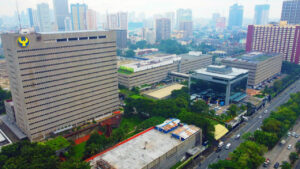Weighing financial benefits against social risks

FINANCE Secretary Benjamin Diokno has expressed his desire to discontinue the activities of Philippine Offshore Gaming Operator (POGO) companies due to the social cost associated with the industry. He said the country would incur a bad reputation for continuing to host the POGO firms during the recent Senate briefing by the Development Budget Coordination Committee (DBCC) on the proposed 2023 national budget.
DBCC is composed of the Department of Finance (DoF), the National Economic and Development Authority, the Bangko Sentral ng Pilipinas, the Department of Budget and Management, and the Office of the President. It determines the country’s overall economic targets, expenditure levels, revenue projections, deficit levels, and financing plans that are submitted to the President and the Cabinet for their approval.
The DoF chief remarked that since the online gaming industry has been banned in other countries like China and Cambodia, “people will ask why are they going to the Philippines?” To which he himself replied: “Maybe because we are loose or we are not strict on our rules, so we have reputational risk.”
On the other hand, the Philippine Economic Zone Authority had warned earlier about a possible real estate vacuum in Metro Manila once POGOs pull out of the country, while the Philippine Chamber of Commerce and Industry was worried that a mass exodus of mainland Chinese-owned POGOs would not only depress the growth of the entire property sector but also deprive the economy of much needed revenues.
In its latest market report, Leechiu Property Consultants projected that office rental rates could collapse by as much as 85% if the remaining legitimate POGOs are kicked out of the country. According to the leading real estate expert, the Manila Bay Area would be the hardest hit with lease figures expected to drop to as low as P300 per square meter from the 2019 peak of P1,500 per square meter.
POGO companies have emerged as the biggest lessees and buyers of office space in the Bay Area, where three integrated casino resorts are operating and one more is under construction. Rental rates there outperformed other property markets such as Makati, Ortigas, Taguig, and Alabang prior to the pandemic.
Not surprisingly, the area has also attracted large-scale reclamation projects spanning the cities of Navotas, Manila, Pasay, and Parañaque as well as the provinces of Cavite and Bulacan. To date, there are 25 such projects that aim to reclaim more than 100 square kilometers of land along the Bay Area’s coast. The Philippine Reclamation Authority (PRA) has so far approved six of these projects, the latest of which is Manila Waterfront City, a joint venture between Waterfront Manila Premier Development, Inc. (WMPDI) and the local government unit of Manila.
This 318-hectare public-private partnership has been valued at P34 billion by its proponent, translating to approximately P10,700 per square meter. Another property developer, Asian Seas Resources and Construction Development Corp., has asked the PRA to scrutinize it considering that a reclamation project should cost about P30,000 per square meter at current prices.
PRA Assistant General Manager Joseph John Literal disclosed that his office is looking into the alleged undervaluation based on industry standards, as the P34-billion project’s valuation is only based on WMPDI’s submissions. He noted that the social environment fund and regulatory fees of P800 million constitute part of the total fees that WMPDI needs to settle with the National Government agency.
Other projects that have already been approved by the PRA include the 360-hectare township of SM Prime Holdings, Inc. in Pasay City; the 418-hectare Horizon Manila consisting of three islands; the 650-hectare Navotas City Coastal Bay reclamation; the 148-hectare Manila Solar City venture; and the 265-hectare Pasay Harbor City project.
It remains to be seen, though, how the country’s real estate market would be able to absorb the combined 2,000-plus hectares of these land reclamation projects should the shutdown of the POGO industry push through.
The opinion expressed herein does not necessarily reflect the views of these institutions and BusinessWorld.
J. Albert Gamboa is the chief finance officer of Asian Center for Legal Excellence and chairman of the FINEX Media Affairs Committee. #FinexPhils www.finex.org.ph




